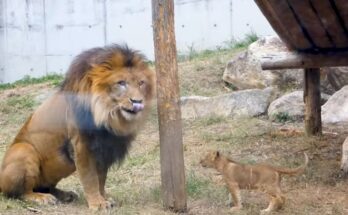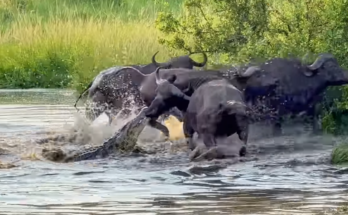
The tiny baby monkey dangled helplessly from its mother’s powerful grasp, its frail body trembling as she held it upside down. The frightened infant’s wide eyes darted anxiously, trying to make sense of what was happening. Its tiny fingers reached out to clutch her fur, seeking comfort, but the mother remained firm—her face a blend of instinct, discipline, and the unyielding realities of survival in the wild.
It was a scene that broke the heart. The baby let out soft, fearful whimpers, its cries barely audible over the rustling of the trees. To a human observer, the moment might seem cruel—a harsh act from a mother toward her child. Yet in the world of monkeys, such behavior is often driven by instinct and care. A mother may discipline her young to teach valuable lessons: to avoid danger, to stop reckless play, or to stay close to the troop. Though her methods seem severe, they often come from an instinctive need to protect. Still, the sight of that tiny, trembling creature stirred deep sympathy in anyone who watched.
When the mother finally loosened her grip, the little monkey clung to her chest with all its strength, shivering but comforted by her warmth. The mother gently groomed its head, her touch soft and reassuring—an unspoken apology and a sign of affection. The stark contrast between the firm discipline and the tender care that followed revealed the depth of emotion in these animals.
This moment served as a powerful reminder that life among monkeys is not always tender or easy. A mother’s love in the wild can be both fierce and compassionate, sometimes painful but always rooted in survival. The image of that trembling baby, suspended between fear and love, will linger in the hearts of all who saw it.


